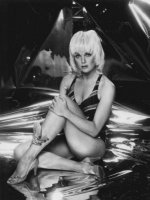In January 2017, Director of National Intelligence James Clapper testified that Russia also meddled in the elections by disseminating fake news promoted on social media
but no one says which stories were fake and who was influenced .....
were the Russians Using 'Russia Today' ?
what twitter or Facebook accounts disseminated 'fake news'
who made the determination was was 'fake' and what was real
Was there collusion? We don't know and certainly no evidence has been released to indicate there was collusion. At this point, any collusion is just speculation. However, all the experts who have investigated have said Russia interfered with the election. To me, a person who is objectively looking at the evidence would have to conclude that Russia interfered.
:shrug:
who gives a #### ....
the US meddled in Russian Elections .....
the FACT is there is NO evidence of collusion between Trump Campaign and the Russians ....
and yeah I can totally See Vlad directing personal to expose Hillary's election shenanigans as revenge for her involvement in the 2011 Russian elections
http://content.time.com/time/world/article/0,8599,2101924,00.html
"We need to look at the chessboard," Putin said, "where all the moves are clear, both the white and the black." The opponent in this game, as Putin went on to explain, is not so much local opposition leaders, who this week organized the largest protests ever against his rule, but the "American partners" moving them around like pawns.
He referred in particular to U.S. Secretary of State Hillary Clinton, who expressed "serious concerns" this week about the fairness of Russia's parliamentary elections, held on Sunday, Dec. 4. The vote allowed Putin's United Russia party to hang on to a slim majority, but well-substantiated claims of voter fraud drove thousands of Russians to the streets of Moscow and other cities to protest on Monday and Tuesday. "She set the tone for certain actors inside the country; she gave the signal," Putin said of Clinton on Thursday. "They heard this signal and, with the support of the U.S. State Department, started actively doing their work."
The image of the U.S. as the covert instigator of the opposition movement has cropped up many times in this election cycle, even before unrest began. On election day in Moscow, for instance, the pro-Kremlin activists gathered near the headquarters of the FSB secret police were passing around decks of cards printed with caricatures of the opposition. The joker in the deck showed a disembodied hand moving a pawn on a chessboard. "The hand of the first secretary of the U.S. Embassy in Russia," the caption on the joker read. "This unseen hand coordinates all the actions of the Russian opposition and writes the script of their show."
It was a crude rendition of classic but still effective political ploy. A generation after the end of the Cold War, 73% of respondents in a poll taken last year still felt that the U.S is "an aggressor trying to take control of all the countries of the world," according to the Levada Center polling agency. So linking political figures to Washington is a reliable way, although a fairly predictable one, to discredit them in the eyes of the Russian public. (This tactic has been used to fine effect against Alexei Navalny, the blogger-activist who helped inspire this week's demonstrations. As pro-Kremlin spin doctors love to point out, he took part in the World Fellows Program at Yale University in 2010 — enough reason for them to label him a traitor employed by the CIA.)
Last edited:




